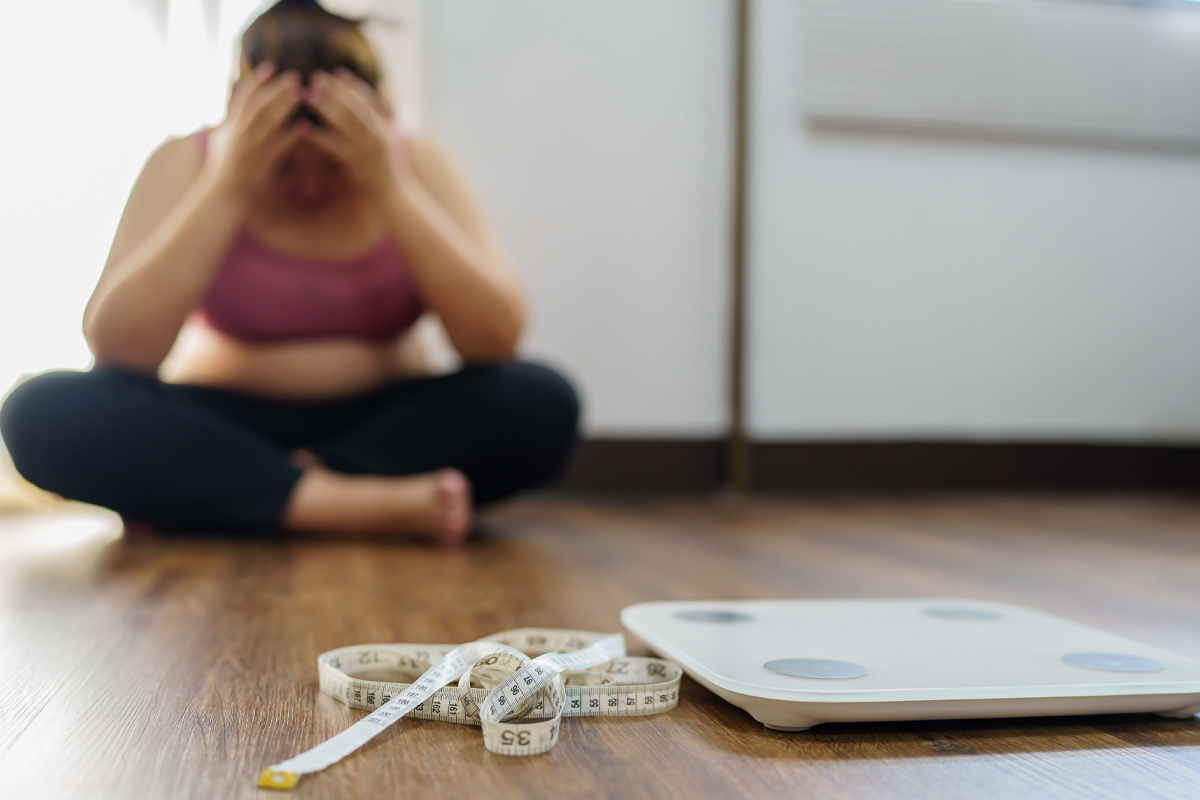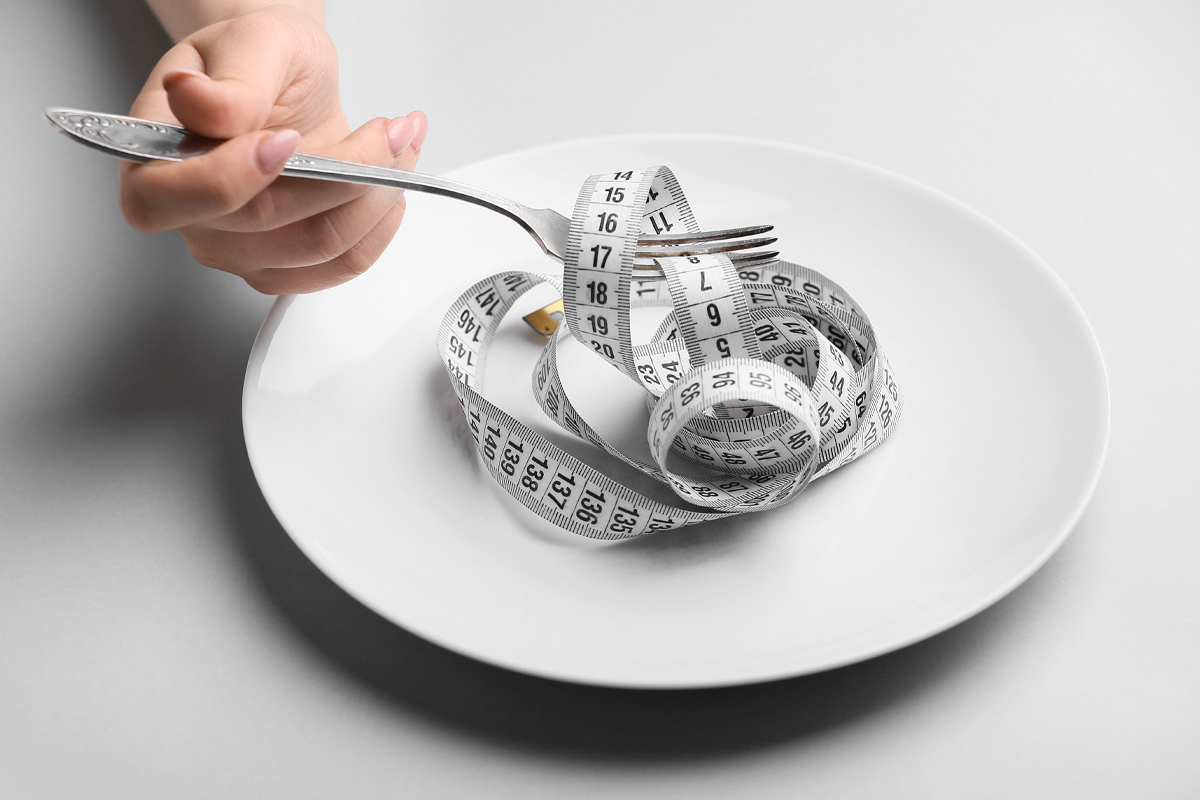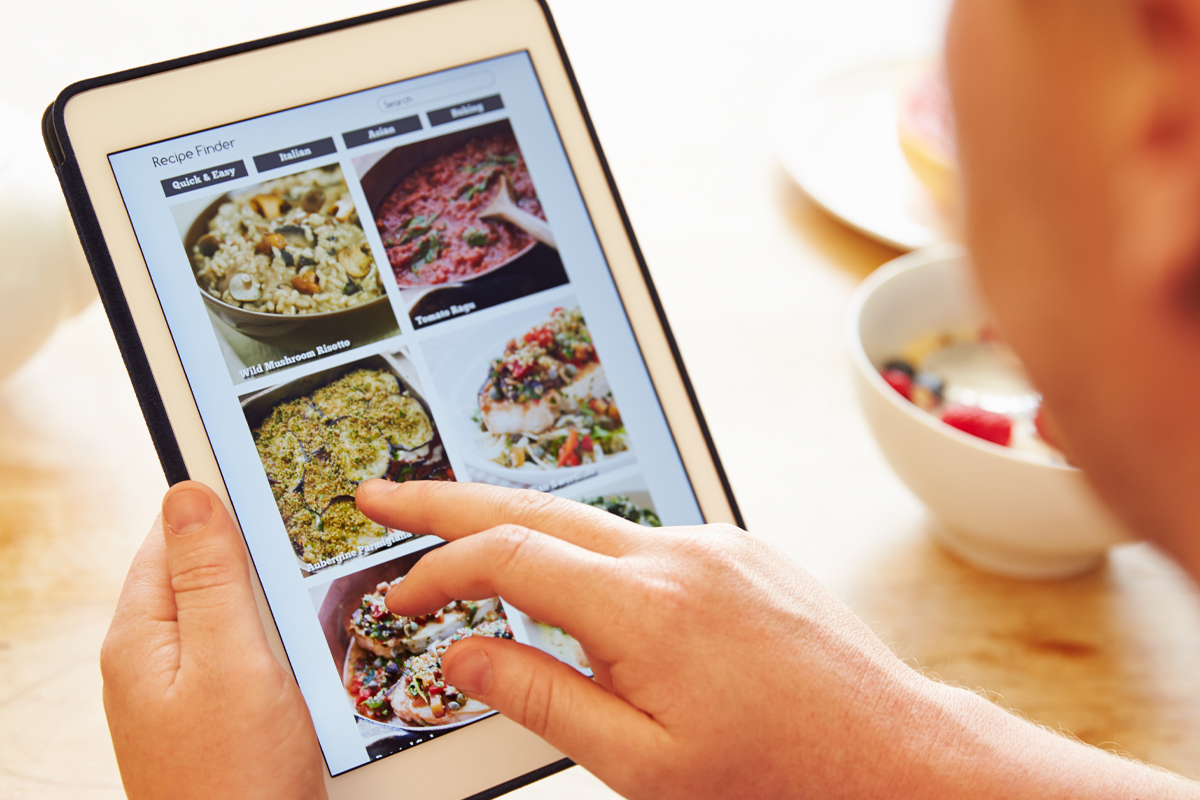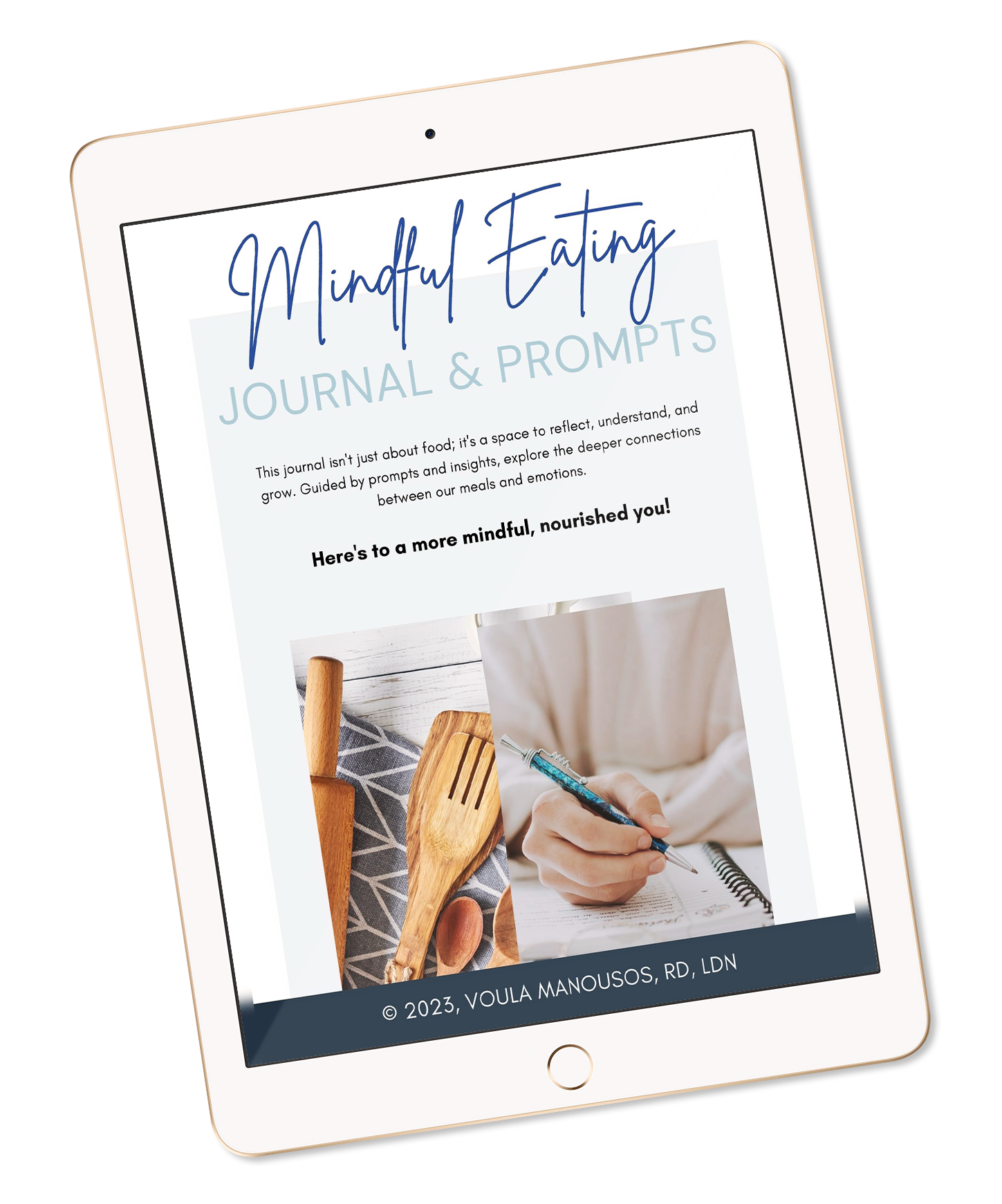
As the new year kicks off, it’s the perfect time of year to ask yourself: are you ready to break free from the exhausting cycle of diet culture?
In case we haven’t met yet, hi! I’m Voula Manousos, a registered dietitian in Winchester, Massachusetts who is fed up with the toxic messaging around food, weight loss, our bodies, and what it means to be healthy.
Let me tell you why I care so much about this.
For years, I’ve seen clients stuck in the “eat, repent, repeat” loop—exhausted, overwhelmed, and in a constant battle with their plates. Diet culture has overstayed its welcome in our lives, and it’s time to part ways for good.
But here’s the thing: breaking free isn’t about another set of rules or restrictions. It’s about finding balance and giving yourself permission to approach health and weight loss in a way that works for your body and your life. That’s why I’m so passionate about helping people ditch the diets and take back their power.
Let’s start this year with a mindset makeover—one rooted in compassion, not control.
What is Diet Culture?
Diet culture is that voice telling you skinny equals healthy and that your worth depends on the number on a scale. It sneaks into conversations, marketing, and even our own heads, constantly pushing the idea that we need to lose weight to be happy instead of focusing on feeling good, being healthy and living fully. It creates a world where you can never have peace with food, constantly second-guessing every bite and battling endless guilt.

Diet Culture & Eating Disorders
Diet culture fuels disordered eating, wrecks your relationship with food, and keeps you stuck in a toxic “eat, repent, repeat” cycle. Oprah herself recently owned up to playing a role in the rise of eating disorders, apologizing for the impact of promoting weight loss and diets that pushed impossible standards. When someone as iconic as Oprah says it’s time to stop the madness, you know it’s serious.
And here’s why I’m so passionate about this: I’ve seen how liberating it is when people break away from these harmful patterns. It’s why my Instagram handle is all about ditching diet culture. If we aren’t connected already, follow along (@free.from.diets.rd) for tips, support, and practical strategies to help you reclaim your relationship with food.
The Power of a Positive Mindset
Let’s talk mindset. Before you roll your eyes and think, “Oh great, another lecture on ‘thinking positive,’” hear me out. Your mindset is the foundation for how you approach everything in life—including your health and relationship with food.
What is Mindset?
At its core, mindset is the set of beliefs and attitudes you hold about yourself and the world around you. It shapes the way you respond to challenges, setbacks, and successes. Think of it like the operating system for your brain—if it’s outdated or glitchy, everything else struggles to run smoothly.

Why Mindset Matters in Weight Management
When it comes to weight and health, mindset is everything. Here’s the truth: If you go into the new year with an all-or-nothing attitude (“I’m going to cut out sugar completely and hit the gym five days a week!”), you’re setting yourself up for burnout. That’s not balance—that’s a crash diet with a prettier name.
Instead of focusing on calories, the scale, or whatever diet trend is buzzing on social media, let’s shift to a mindset that’s about fueling your body and creating healthy eating habits.
Think about giving your body the nourishment it needs to thrive, being kind to your digestive system, and making choices that honor your future self.
That means asking questions like:
- How will this meal make me feel later?
- Am I eating in a way that supports my energy, focus, and mood?
- What can I do today to help my body feel strong and supported tomorrow?
When you stop thinking about food as “good” or “bad” and start seeing it as a tool to care for your body, everything changes.
You’ll notice how much lighter it feels—physically and emotionally.
A Fresh Approach for the New Year
Instead of New Year’s resolutions that revolve around restriction and guilt, let’s focus on goals that build you up.
For example:
- Set an intention to practice mindful eating instead of obsessing over calories.
- Commit to moving your body in ways that feel good—whether that’s yoga, dancing, or a walk in your favorite park.
- Aim to prioritize sleep, hydration, and stress management as much as your meals.
By shifting your mindset to one of self-care rather than self-control, you’ll start to see changes that last. Not just on the scale (if weight loss is a goal) but in how you feel overall.
If you’re ready to start making this mindset shift today, I’ve got a free resource to help you. Download my Mindful Eating Food Journal here. It’s a simple yet powerful tool to help you tune into your body’s cues, reflect on your eating habits, and begin fueling your body with intention and kindness. Consider it your first step toward a healthier, more balanced relationship with food.
Finding Balance: Tips for Breaking Free from Diet Culture
Breaking free from diet culture isn’t a one-size-fits-all process. Instead, focus on what works for you and build mindful eating habits that support your unique physical, mental, and emotional health.

Here are some practical tips to help you take your first steps toward balance.
The Role of Mindful Eating Practices
One of the first steps to breaking free is understanding what your body needs. Forget the noise of fad diets and “one-size-fits-all” plans and empower yourself with knowledge.
- Pay Attention to Your Current Cravings and Habits: Instead of judging your cravings, get curious. Craving chocolate? Ask yourself why—are you tired, stressed, or needing comfort? Sometimes, cravings are less about the food itself and more about what’s happening in your life.
- Mindful Eating: Start by tuning into your eating habits. Are you “emotional eating” because you’re hungry, bored, or stressed? Mindful eating helps you reconnect with your body’s hunger and fullness cues so you can make choices based on what your body actually needs and steer clear of eating disorders. (Need help getting started? Download my Mindful Eating Food Journal here.)
- Understand How Diet Culture Can Lead to Eating Disorders: When you’re constantly told to restrict, count, or burn off food, it can lead to disordered eating patterns. Educating yourself about these risks can help you recognize unhealthy habits and take steps to practice mindful eating.
Centering and Grounding Activities
Breaking free from diet culture isn’t just about weight loss and food; it’s also about creating space to connect with yourself and reduce stress. Stress often leads to emotional eating or impulsive food decisions, so finding ways to ground yourself is key.
- Meditation: Even five minutes a day can help you slow down, clear your mind, and create a sense of calm. Apps like Headspace are great tools to get you started if you’re new to meditation.
- Yoga or Gentle Movement: Yoga can help you reconnect with your body in a positive way. Gentle stretches or poses can reduce tension and help you approach your day with more clarity and perspective. New to yoga? Try out this 10-minute “Yoga for Beginners” video to see if it’s right for you.
- Journaling: Take a minute each day to write down how you’re feeling. This could be as simple as listing three things you’re grateful for or reflecting on how your body feels after a meal. Journaling can help you identify patterns and create a sense of awareness around your habits.

Building Healthy Habits That Stick
Building balance doesn’t mean overhauling your entire life overnight. Instead, focus on starting small and being consistent.
Here are a few habits to focus on:
- Eat at the Table: Ditch the distractions and commit to eating your meals at a table. Eating at your desk or watching TV leads to mindless eating, where you’re not fully aware of what or how much you’re consuming.
- Put Down the Phone: Scrolling through social media or watching videos can pull you out of the moment, making it harder to recognize your body’s cues and potentially leading to binge eating or emotional eating. Plus, staying glued to your phone during meals can disconnect you from the simple joys of eating.
- Plan Your Meals: Having a plan can help you make balanced food choices. Planning doesn’t mean falling into rigid eating patterns—it’s about creating a flexible framework that supports your goals while allowing room for spontaneity. This approach helps you establish healthier eating behaviors without feeling restricted. If you’re short on ideas, consider downloading my free guide with five easy dinner recipes.
- Practice Intuitive Eating: This means listening to your body’s cues and trusting yourself to make choices that feel good—without guilt. Intuitive eating works hand in hand with mindful eating, which means being present during meals and paying attention to your physical hunger cues and food cravings. Remember, your body knows what it needs; you just have to listen.
- Eat Slowly: It takes about 20 minutes for your brain to register that you’re full. Eating slowly is one of the most effective mindful eating practices, helping you tune into your body’s signals and better regulate your food intake. This simple habit not only supports digestion but can also prevent overeating, which may help you lose weight in a sustainable way.
By focusing on these small steps, you’ll start to feel more connected to your body and less controlled by the noise of diet culture.
Remember, breaking free is a process, and it’s okay to take it one step at a time.

The Role of Self-Compassion
If there’s one thing diet culture doesn’t teach us, it’s how to be kind to ourselves. In fact, it thrives on the opposite—shame, guilt, and relentless self-criticism. But here’s the truth: self-compassion is one of the most powerful tools you can use to break free from diet culture and build a healthier relationship with food and your body.
What Is Self-Compassion?
Self-compassion is about treating yourself with the same kindness, understanding, and patience that you’d offer a close friend. It’s about recognizing that you’re human—that slip-ups, bad days, and imperfections are part of life, not reasons to punish yourself.
Why Self-Compassion Matters
When you approach your health with self-compassion, you create space for growth instead of guilt. You start to see challenges as opportunities to learn, rather than reasons to give up.
For example:
- Instead of Thinking: “I ate something ‘bad’ today, so I might as well give up.”
- Try Thinking: “One meal doesn’t define me. I can choose something that feels good for my body next time.”
Self-compassion helps you move away from the all-or-nothing mindset that diet culture promotes. It allows you to focus on progress over perfection, which is where real, lasting change happens.
Practicing Self-Compassion in Daily Life
- Reframe Negative Self-Talk: Catch yourself when you start to spiral into self-criticism. Instead of saying, “I’m so bad at this,” try, “I’m doing my best, and that’s enough.”
- Celebrate Small Wins: Did you make a nourishing choice today? Take a walk? Eat a meal mindfully? Celebrate those moments, no matter how small they feel.
- Treat Yourself Like a Friend: Imagine what you’d say to a friend who’s feeling discouraged. Now say those same words to yourself.
- Take Breaks: Some days, the best thing you can do for your health is to rest. And that’s okay. Self-compassion means knowing when to push and when to pause.
By practicing self-compassion, you’ll find it easier to approach your health with balance and grace. Instead of fighting against yourself, you’ll be working with yourself—creating a new relationship with food, your body, and your goals that feels sustainable and empowering.

Support Systems: You Don’t Have to Do It Alone
Breaking free from diet culture and building healthier habits can feel overwhelming—especially if you’re doing it solo.
The good news? You don’t have to.
Having the right support system in place can make all the difference in staying consistent, feeling motivated, and making progress toward your goals.
Connecting with Like-Minded Communities
When you surround yourself with people who share similar goals and values, it creates a sense of belonging and encouragement. Whether it’s a local group, an online community, or even a few friends with similar health goals, having people to share wins, struggles, and ideas with can help you stay on track.
- Join a group focused on mindful eating or body positivity.
- Participate in online forums or social media groups that celebrate progress over perfection.
Being part of a supportive community reminds you that you’re not alone—and that every step forward is worth celebrating.
Staying Consistent with New Habits
Change doesn’t happen overnight, and that’s where accountability comes in. Having a buddy or a group to check in with can make it much easier to stick with your new habits. Whether it’s meal planning, exercising, or prioritizing self-care, doing it with others helps you stay committed.
- Find an accountability partner for regular check-ins.
- Share goals with a friend who can offer encouragement and gentle reminders.
- Consider group fitness classes or wellness challenges to stay motivated.
There’s strength in numbers, and knowing someone’s cheering you on can be just the push you need to keep going.
Seeking Professional Help When Needed
Sometimes, the best way to make progress is to work with someone who can guide you. A registered dietitian or coach can provide personalized support, strategies, and encouragement tailored to your unique needs and goals.
Whether you’re working through disordered eating patterns, struggling with your relationship with food, or just need help building a plan that works for your life, professional support can offer clarity and direction.
If you’re looking for personalized guidance and support, I’d love to help you. Book a call with me to learn more about my personalized coaching program, where we’ll work together to create a sustainable, balanced approach to your health that fits your life. Book Your Call Here.

Reflecting on the New Year
As we step into the new year, let’s change the narrative around health and wellness. Instead of making resolutions that feel like punishments or ultimatums, let’s ask a better question: What are my goals?
Start small. Think about one step you can take today that aligns with your bigger picture of health. Maybe it’s practicing mindful eating at one meal, swapping a sugary drink for water, or setting aside five minutes for quiet reflection. Whatever it is, that one small goal can create a ripple effect, leading you closer to a life of balance—not perfection.
Breaking free from diet culture is a journey, not a destination. Focus on fueling your body, honoring your needs, and making choices that reflect kindness toward yourself—now and in the future.
You’ve got this. Take that first step today, and know that every little bit of progress adds up to something bigger. Let’s make this the year we focus on balance, self-compassion, and creating a relationship with food and our bodies that feels good—for life.
If you’re ready to take the next step and want personalized guidance on your journey, I’d love to support you. Let’s work together to create a plan that feels balanced, sustainable, and tailored to your life. Book a complimentary call with me today, and let’s start building the healthier, more empowered version of you!





